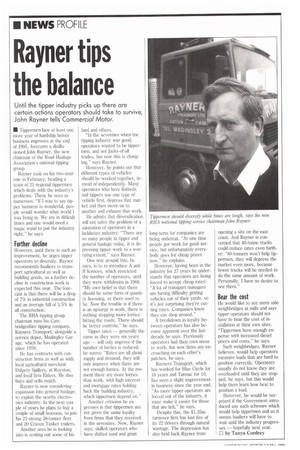Rayner tips the balance
Page 32

If you've noticed an error in this article please click here to report it so we can fix it.
Until the tipper industry picks up there are certain actions operators should take to survive, John Rayner tells Commercial Motor.
• Tippermen face at least one more year of hardship before business improves at the end of 1991, forecasts a disillusioned John Rayner, the new chairman of the Road Haulage Association's national tipping group.
Rayner took on his two-year role in February, heading a team of 21 regional tippermen which deals with the industry's problems. These he sees as numerous: "If I was to say tipper business is wonderful, people would wonder what world I was living in. We are in difficult times and one would need a magic wand to put the industry right," he says.
Further decline
However, until there is such an improvement, he urges tipper operators to diversify. Rayner recommends hauliers to transport agricultural as well as building goods, as a further decline in construction work is expected this year. The forecast is that there will be a drop of 7% in industrial construction and an average fall of 15% in all construction.
The RHA tipping group chairman runs his Cambridgeshire tipping company, Rayners Transport, alongside a service depot, Madingley Garage, which he has operated since 1970.
I le has contracts with construction firms as well as with local agricultural merchant Dalgety Spillers, at Royston, and local firm Elders. He also buys and sells mulch.
Rayner is now considering expansion into general haulage, to exploit the nearby electronics industry. In the next couple of years he plans to buy a couple of small boxvans, to join his 21-strong 38-tonner fleet and 20 Craven Taskcr trailers.
Another area he is looking into is renting out some of his land and offices.
"In the seventies when the tipping industry was good, operators wanted to be tippermen, and not Jacks-of-all trades, but now this is changing," says Rayner.
However, he points out that different types of vehicles should be worked together, instead of independently. Many operators who have flatbeds and tippers use one type of vehicle first, depress that market and then move on to another and exhaust that work.
Ile admits that diversification will not solve the problem of a saturation of operators in a lacklustre industry: "There are SO many people in tipper and general haulage today, it is depressing tipper work to a worrying extent," says Rayner.
One way around this, he says, is to re-introduce A and B licences, which restricted the number of operators, until they were withdrawn in 1968. "My own belief is that there should be some form of quantity licensing, as there used to be. Now the trouble is if there is an upsurge in work, there is nothing stopping more lorries hitting the roads. There should be better controls," he says.
Tipper rates — generally the same as they were six years ago — will only improve if the number of lorries is reduced, he warns: "Rates are all about supply and demand, they will only improve when there are not enough lorries. At the moment there are more lorries than work, with high interest and mortgage rates holding back the building industry, which tipperrnen depend on."
Another criticism he expresses is that tippermen are not given the same loyalty from firms that they received in the seventies. Now, Rayner says, skilled operators who have shifted sand and grain long-term for companies are being undercut. "At one time people got work for good service, but unfortunately everybody goes for cheap prices now," he explains.
However, having been in the industry for 27 years he understands that operators are being forced to accept cheap rates: "A lot of transport managers are having difficulty getting vehicles out of their yards, so it's not surprising they're cutting rates. Companies know they can shop around."
A breakdown in loyalty between operators has also become apparent over the last decade he says. Previously operators had their own areas to work, but now firms are encroaching on each other's patches, he says.
Rayners `I'ransport, which has worked for Blue Circle for 18 years and Tarmac for 10, has seen a slight improvement in business since the year end. "As more tipper operators are forced out of the industry, it must make it easier for those that are left," he says.
Despite this, the 21.25m turnover firm has lost five of its 22 drivers through natural wastage. The depression has also held back Rayner from opening a site on the east coast. And Rayner is concerned that 40-tonne trucks could reduce rates even further: "40-tonners won't help tippermen, they will depress the market even more, because fewer trucks will be needed to do the same amount of work. Personally, I have no desire to see them."
Bear the cost
He would like to see more axle weighbridges at mills and says tipper operators should not have to bear the cost of installation at their own sites. "Tippermen have enough expense with increased diesel prices and costs," he says.
Such weighbridges, Rayner believes, would help operators measure loads that are hard to position correctly. Operators usually do not know they are overloaded until they are stopped, he says, but this would help them learn how best to position a load.
However, he would be surprised if the Government introduced any such schemes which would help tippermen and so it seems hauliers will have to wait until the industry progresses — hopefully next year. 0 by Tanya Cordrey








































































































































































